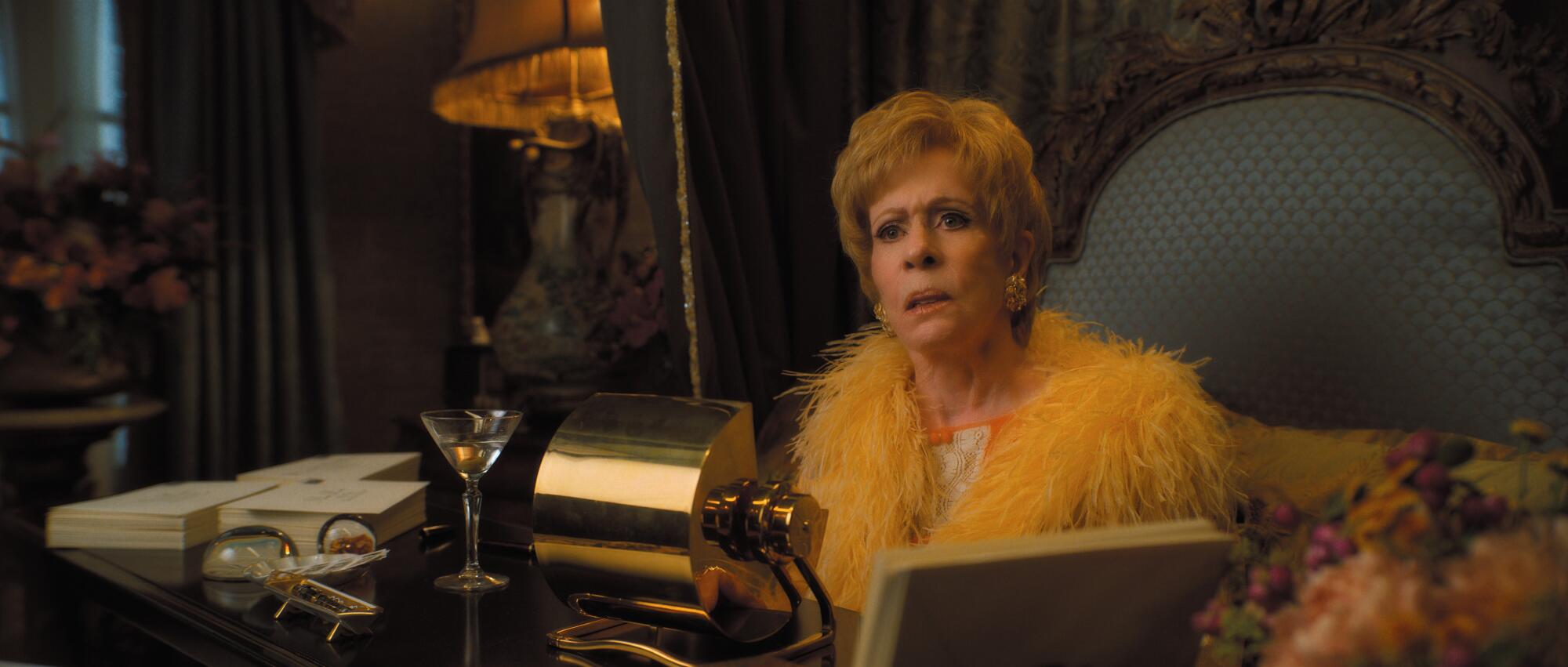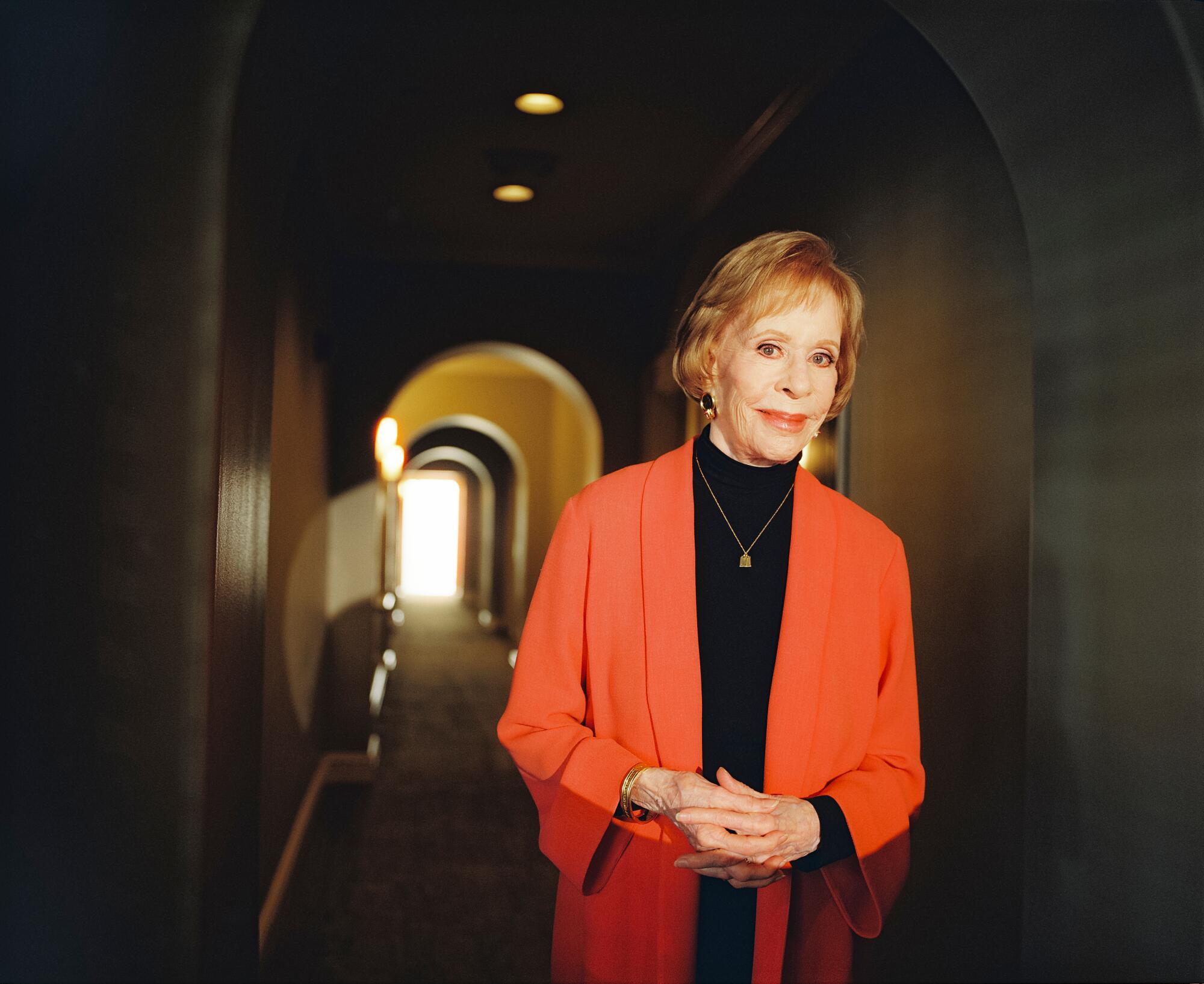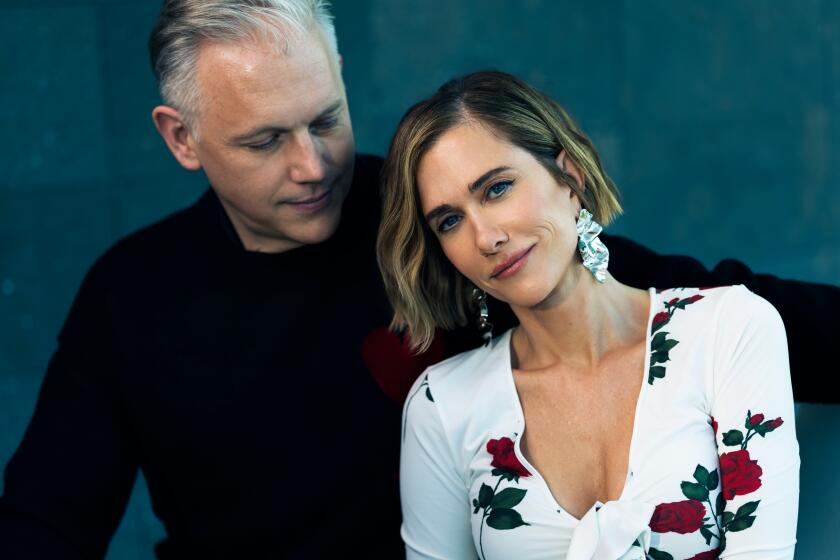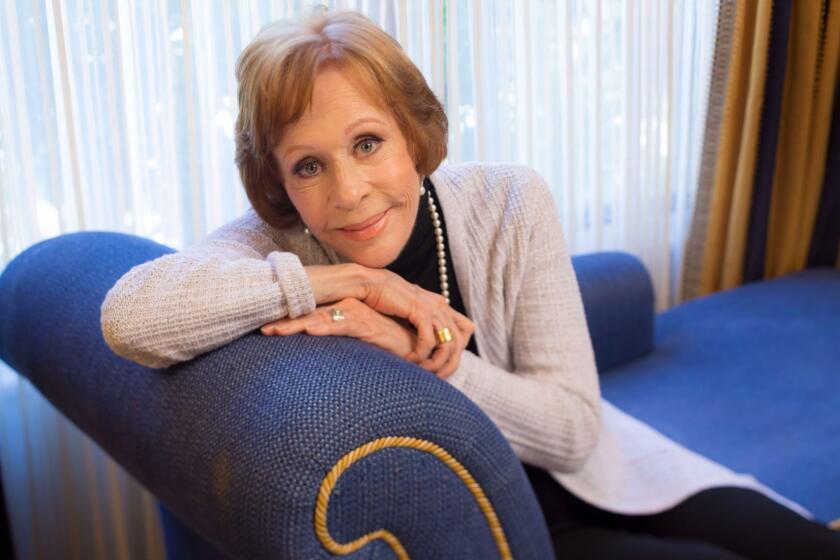
- Share via
In a career that’s spanned 70 years, Carol Burnett has been a gifted comedian and singer on television, the silver screen and Broadway. But until she signed up for “Palm Royale,” she had never tackled a role that would require her to spend a large chunk of time speaking in incomprehensible babble. At 91, she’s thrilled to still experience professional firsts.
“Abe Sylvia, the creator and showrunner, [told me] I can’t really form words because I’m just coming out of [a coma],” she recalls over the phone. “And I said, ‘What do I do here?’ He said, ‘Oh, just do gibberish’ — but then he said, and I totally agreed, ‘Even though you’re doing gibberish, if you had the lines, how would you emphasize what you want to get across?’ So that’s what I did — you can’t write gibberish in a script, so I had to make all of that up. I was improvising — I had a lot of fun gibberishing, if there is such a verb.”

If Carol Burnett says it’s a verb, then it is. Few stars are as beloved or influential, and in the Apple TV+ series, she’s delightful as Norma Dellacorte, the vindictive queen of upper-crust society in Palm Beach, Fla., circa 1969 — even though she’s slipped into a coma after an embolism. For the first few episodes, Norma is unconscious, but once she awakens, Burnett shows off the skill at physical comedy that has been her trademark since before her pioneering variety series, “The Carol Burnett Show.” Some of “Palm Royale’s” funniest moments involve Norma fighting her immobile mouth to push words out, and Burnett makes a meal of her character’s affliction.
‘She believes in herself and she’s never embarrassed,’ the actor says of her character. She was drawn to the show’s mix of absurdist comedy and emotional drama.
Burnett, who is nominated in the supporting actress in a comedy category, is picky about what projects she takes on. “At this stage in my life,” she says, “I just want to do stuff that I think is going to be fun.” Her recent heralded turn in “Better Caul Saul” happened only because co-creator Vince Gilligan was a friend and thought she’d be right for the part. “I was a big fan, and he called me: ‘We have a role we would love you to do, and it’s a pivotal role because she will be the one that brings Saul down.’ And I said, ‘I’m in.’ That kicked off a whole new, I don’t know, renaissance — people who didn’t know my show, I’d go out to dinner and they’d say, ‘Oh, you’re the lady on ‘Better Call Saul.’ So then it dovetailed into ‘Palm Royale.’”
In conversation, Burnett is sprightly and sharp, as marvelous as one would hope. She loves telling stories — like how, if things had worked out differently, maybe she would have gone into journalism. But when she attended UCLA, there was no journalism program, so she pivoted to performing, preparing a comedic monologue for a class. “I got a bunch of laughs, and I thought, ‘This is a good feeling.’ I tried out for some other plays, and all of a sudden, I thought, ‘I think this is what I want to do with my life.’ Then, one of the music people asked me if I could carry a tune. And I said, ‘Yeah,’ because my mother and grandmother and I used to sing in the kitchen. I realized I could belt.”

In the midst of filming “Palm Royale’s” first season, Sylvia let Burnett in on a secret about the scheming Norma that audiences wouldn’t learn until the finale — spoiler alert — she’s actually Agnes, a woman who stole Norma’s identity decades earlier. “Her character is very dark,” says Burnett, approvingly, expressing a sympathy for her situation. “I don’t know who Agnes is yet, but all I know is she’s scared because she’s old. As she says, when you get old, nobody pays attention [to you] anymore and they want to take over [your life]. So, she’s resentful and old and scared — that’s so easy to play.” Burnett laughs. “Not that I’m resentful, but I am old — and I’m not scared, thank God.”
Although “Palm Royale” is principally a comedy, its time period provides a sobering backdrop for Kristen Wiig’s character’s plotting to work her way up the Palm Beach social ladder. Vietnam and women’s liberation lend the show a sociopolitical texture, and it’s a fraught era that Burnett remembers well. “The Carol Burnett Show” was rolling along in 1969, although she chose not to reflect that national turmoil on her program.
“I wanted it to be an old-fashioned musical comedy revue that you would see on Broadway,” she says. “I wanted belly laughs. I wanted sketches. I wanted guest stars and music and dancers and all of that. But, of course, I knew what was going on in the world — maybe subconsciously, I felt we need to just be here to make people laugh.”
In her free time, though, she was very politically engaged. “I embraced the ERA [Equal Rights Amendment] — I went to all kinds of fundraisers. I remember I called — I won’t say who, but it was a famous male performer — and I said, ‘If you’d get on board, it would just be great.’ He said, ‘I don’t want to vote for the ERA because that means women will be smoking cigars.’” Burnett holds for a beat. “Isn’t that the stupidest thing you’ve ever heard? I had three daughters, and I wanted them to have equal pay. I mean, it still makes sense — it should be an amendment.”
Will “Palm Royale” be her final time in front of the camera? “I think I might hang it up as far as acting goes, unless something really insane comes [along],” says Burnett, who has “a couple of irons in the fire [that are] not performing,” including developing an Apple TV+ series. Considering she’s won seven Emmys, a Grammy and a Tony, her legacy can be measured in endless ways — including the fact that her fans tend to burst into happy tears at the mere sight of her. When Julia Louis-Dreyfus had Burnett on her podcast, “Wiser Than Me,” she started crying during the episode’s intro. “Palm Royale” cast members got weepy at an early table read simply being in Burnett’s presence.
Is she aware of this effect she has on people?
“I am very moved and touched,” she replies modestly. “It’s funny — it’s the way I felt when I met [Lucille Ball], because she’d been in my life for such a long time. I think that’s what it is — they’ve known us for a long time, they’ve known my show for a long time.”
Perhaps, but it’s also a testament to the joy she’s given viewers, inspiring generations of young performers to follow in her footsteps. Burnett demurs — she’s just here to have fun and enjoy being part of “Palm Royale’s” accomplished ensemble, who adore her.
“Sometimes, [people] say, ‘Well, you’re the reason I’m doing what I’m doing,’” she says, disbelievingly. “And my response to that is, if I’d never been born, they’d be doing what they’re doing. Talent will out.”
More to Read
From the Oscars to the Emmys.
Get the Envelope newsletter for exclusive awards season coverage, behind-the-scenes stories from the Envelope podcast and columnist Glenn Whipp’s must-read analysis.
You may occasionally receive promotional content from the Los Angeles Times.












